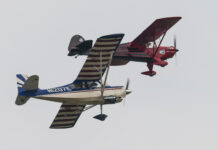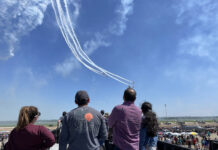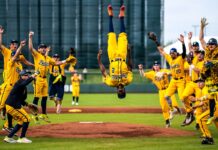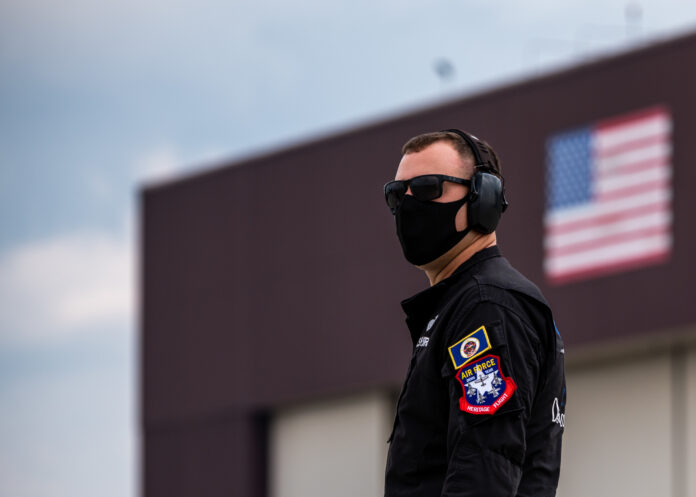
It would be a gross understatement to say that the COVID-19 virus was a gut punch to the air show industry. Unlike the sequestration of 2013, where many shows were able to continue without military support, most of the 2020 shows were forced to cancel or postpone. There is no way to total up the true cost, but pilots saw cancelled contracts, vendors purchased inventory they couldn’t sell, pyrotechnics professionals bought fireworks that went unused. Volunteer groups missed out on much needed revenue they would have earned selling programs, operating food booths or parking cars.
Silver linings from the pandemic are few and far between, but the resilience and innovation that is the hallmark of our industry did shine through in a variety of ways. The term “virtual air show” entered our lexicon as air shows streamed sophisticated video productions in order to stay connected with their fan base. And other organizers staged drive-in air shows, making it clear that our industry, while severely wounded, did not roll over and die.
 The Abbotsford International Air Show in British Columbia opted for a virtual show. “We sold a lot of tickets in November 2019 ahead of Christmas, generating over $100,000 in revenue. Fortunately, few fans asked for their money back when we had to cancel, so we put the money into our reserves for next year and promised to honor this year’s tickets at next year’s show,” said air show president Jim Reith.
The Abbotsford International Air Show in British Columbia opted for a virtual show. “We sold a lot of tickets in November 2019 ahead of Christmas, generating over $100,000 in revenue. Fortunately, few fans asked for their money back when we had to cancel, so we put the money into our reserves for next year and promised to honor this year’s tickets at next year’s show,” said air show president Jim Reith.
Reith said the Canadian government provided financial assistance, paying 75% of staff wages from March thru September. That, combined with their “rainy day fund,” allowed them to survive. “The virtual show was offered to our fans free of charge and we had 25 thousand fans watching, which was amazingly successful,” Reith said.
Drive-in events, where carloads of fans could park in designated areas and maintain social distance, became popular late in the season in communities where restrictions eased. To accommodate its fans the New York International Air Show was able to move its late August drive-in show from Stewart International Airport to the nearby Orange County Airport where a 200-acre grass infield was available for parking. It was billed as a model for the era of social distancing.
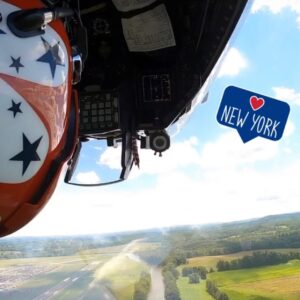 They spread the cars out over a half-mile wide area inside the airport and provided viewing areas beside each vehicle that complied with all social distancing guidelines. The lineup included the F-22 Raptor demo, the F-35 Lightening II demo, and the Air Force Thunderbirds, along with civilian performers.
They spread the cars out over a half-mile wide area inside the airport and provided viewing areas beside each vehicle that complied with all social distancing guidelines. The lineup included the F-22 Raptor demo, the F-35 Lightening II demo, and the Air Force Thunderbirds, along with civilian performers.
At the other end of the country, the Tri-City Water Follies in Kennewick, Washington moved its air show from late July to Labor Day and hit a home run when it pulled off a three-day drive-in format. The air show is normally part of the annual unlimited hydroplane races on the Columbia River that separates Kennewick and its sister cities of Pasco and Richland. It’s one of the largest summer events in the State of Washington.
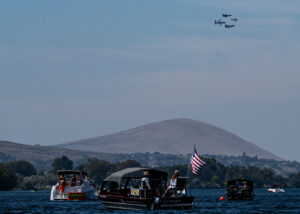
“It became obvious that regulations weren’t going to relax in time for the boat races in July, but as we eased into August the number of COVID cases in our area began dropping to the point we felt we could at least stage a drive-in air show,” said Water Follies events director Kathy Powell.
With a mile of show line on each side of the river the venue is perfect for loud, fast aircraft and Powell’s team was able to capitalize on all of the cancellations that took place across the country when it came to obtaining military assets. The end result was full demonstrations by the F-16, F-35 and A-10, plus a heritage flight and civilian performers.
Powell said she contacted other air shows to learn from their experience, then went to work with city officials and local health authorities. “They whole-heartedly supported the event and worked hard to help us develop a plan to allow it to go forward,” Powell said. They established 400 parking spaces on the Kennewick side of the river and 300 on the Pasco side. And to minimize personal contact they also used an e-ticket vendor for the first time.
“Attendance on Friday was light because school was in session and a lot of parents had returned to work, but this allowed us to fine tune our parking skills. We found some weaknesses which we were able to correct, so we were ready for the near sellout crowds on Saturday and Sunday,” Powell said.
She said she used up every lucky penny she had on this one. “The crowd was awesome, the weather was perfect, and we had more military participation than ever before. It was a great way for our community to end the summer,” she said.
The show in Huntington Beach, California wasn’t so fortunate. Show director Kevin Elliott had hoped restrictions would ease by the time their mid-September show was scheduled, but no such luck. “We looked at how to provide social distancing and still hold an economically viable event that was both fun and safe, but just couldn’t make it happen,” he said.
The Huntington Beach show is a free, privately funded event, and one of the largest over-the-water events in the country. Is there a silver lining? Elliott says yes. “As horrible as this year has been, it has deepened our relationships between shows. We shared information with other shows on a regular basis, have shared lessons learned, and have become stronger as an air show family by working collaboratively.”
With so many shows cancelling over the summer, Air Combat Command (ACC) was faced with a dilemma…supporting shows where it could, while keeping its pilots and crews safe. Each of the four solo demo teams was scheduled to fly 20 shows this year, but because of the virus they only flew 20 shows between them. “Our pilots need to be on the road. It’s their job and if they aren’t doing shows they are losing out on a lot of valuable experience,” said ACC scheduler Larry Schleser. That’s why the few remaining shows were receiving far more support than expected. “We spent a lot of time talking to the organizers, laying out our expectations, and telling them what they could expect from us,” he said.
 One of the most unusual challenges for ACC this year was doing the show in London, Ontario Canada. To meet COVID guidelines the show had planned to have one hotel for the exclusive use of all U.S. performers, which included all 4 ACC demos teams and the 128 members of the Thunderbirds. The hotel had two restaurants and an exercise facility for their exclusive use. But three weeks before the show the Canadian Minister of Defense said he couldn’t allow all of those people and jets into Canada. The decision could have been a death blow to the event but the show organizers worked with ACC and were able to stage the Thunderbirds and all four demo teams from the U.S. Air National Guard base just across the border in Selfridge, Michigan.
One of the most unusual challenges for ACC this year was doing the show in London, Ontario Canada. To meet COVID guidelines the show had planned to have one hotel for the exclusive use of all U.S. performers, which included all 4 ACC demos teams and the 128 members of the Thunderbirds. The hotel had two restaurants and an exercise facility for their exclusive use. But three weeks before the show the Canadian Minister of Defense said he couldn’t allow all of those people and jets into Canada. The decision could have been a death blow to the event but the show organizers worked with ACC and were able to stage the Thunderbirds and all four demo teams from the U.S. Air National Guard base just across the border in Selfridge, Michigan.
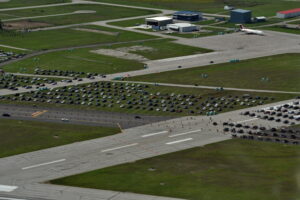 But basing the teams in Michigan was only part of the problem. To pull the show off 21 staff still had to be on the ground in London. They included safety observers, narrators, videographers, and Public Affairs personnel. To meet Canadian restrictions Schleser said they had to test, quarantine and retest prior to entering Canada. “This was a tremendous effort at the last minute from both ACC and the London show to make it work within the COVID restrictions,” he said.
But basing the teams in Michigan was only part of the problem. To pull the show off 21 staff still had to be on the ground in London. They included safety observers, narrators, videographers, and Public Affairs personnel. To meet Canadian restrictions Schleser said they had to test, quarantine and retest prior to entering Canada. “This was a tremendous effort at the last minute from both ACC and the London show to make it work within the COVID restrictions,” he said.
Being a show organizer coping with COVID is one thing. It’s another if you are a performer who depends on those shows for income. Jacquie Warda, better known as Jacquie B, started the season with 15 shows on her schedule. Then shows started cancelling. Fortunately, none of them asked for their deposits back but did ask that she carry the deposits forward into next year. “I’m using the deposits to cover my costs because I have to be ready to perform when the call comes. Aerobatics is a perishable skill that I didn’t want to lose. We will all be a year older when the 2021 air show season rolls around and I want to stay in shape,” she said.
Performer Kirby Chambliss is fortunate in that he has a major sponsor who has been willing to stay with him in spite of circumstances, though he did lose a few smaller sponsors. “I’m already booking shows for next year. All of the shows that cancelled want me back so I’m in good shape,” he says.
Chambliss is staying current, but says it will take him several weeks of intense practice before he is comfortable flying his full routine. “I’ll give myself time to get back into it as next year’s season gets closer,” he said.
Performer Buck Roetman considers himself fortunate. “I’m in a position where I have no debt so I’m OK. I had ten shows booked but I don’t rely on shows for my livelihood,” he said. Roetman is chief pilot for a management firm and corporate aviation is again going strong because business people are tired of the airline restrictions. He did one show in 2020 which he says paid enough to cover his insurance cost.
Known for his theme-based acts as well as one of top comedy acts in the business, performer Kyle Franklin was hit hard when shows started cancelling. “This is what I do for a living and it hurt,” he said.
On the bright side, he remarried last year and says not traveling as much has allowed him to spend more time with his wife. He’s also been able to attend to a number of projects that he has been putting off. “This is the longest I’ve been home in 28 years,” he said. And he says there is still a dark cloud over our industry. “Most everyone I know in the business is hurting.”
P-51 pilot Scott Yoak says sometimes he feel like a passenger on the Titanic. “There isn’t anything I can do to change things. This situation shows just how vulnerable our industry is,” Yoak said. He had 22 shows booked this year and many of them won’t run again until 2022. Yoak says he’s lost a major sponsor because of it and they aren’t sure if they will come back. Yoak makes his living flying for an airline, but he said he relies on air shows to cover the cost of maintaining his expensive warbird.
Yoak is somewhat philosophical about what our industry has been going through. “In baseball you sometimes learn more from a strikeout than you do from a home run. If one virus can take out an entire industry, then we need to develop contingency plans. Out of the ashes will rise a Phoenix. Innovation will be the key,” he said.
MXS pilot Scott Francis lost 75% of his shows this year and considers himself fortunate. “I’ve had enough shows to maintain my flying skills and my G-tolerance to stay safe, but I don’t feel as polished as I would like to be,” he said.
He applauds those shows that went virtual or shifted to drive-in events, but says the life blood if air shows is not the aerobatics. “The life blood of our business is the personal contact…the talking with kids, showing them the airplanes, showing younger generations what aviation is all about,” he said.
Performer Mike Wiskus flew the New York show and the Tri Cities show on back-to-back weekends. For him the two drive-in events were like flying normal shows since both were remote shows. “It felt quite normal to me, other than I could see that everyone was wearing a mask and limiting their interactions,” he said
Of his 22 shows scheduled, Wiskus was able to fly eight. Four were remote and four were staged on their airports. “There were no sponsor parties, and no contact with the fans, which was unfortunate, but it was obvious that fans were hungry for what we do, which gives me hope for next year,” he said
Air bosses are in a unique situation. While they, too, lost out on income, their overhead expenses are few. But based on their contracts they invested a lot of time in preparing paperwork for shows, only to see them cancelled. And most of the paperwork can’t be rolled over.
“I lost every one of my shows this year,” said air boss Jim Tucciarone. “It won’t be difficult to spool up again because I’ve been doing this for a long time, but all of us who do this will have to develop new waivers and new TFRs because we won’t know who the performers will be next year,” he said.
Air Boss Jim Gibson lost all but one of his shows. “I did the paperwork for twelve waivers but eleven shows cancelled so I didn’t get paid for that work. It feels like we are digging ourselves out of a mudhole,” he said.
Booking agent Erin Shuttleworth makes her living connecting performers and air shows. “My business came to a screeching halt. This was going to be my best year and I had a number of contracts hanging out there. COVID pulled the rug right out from under me,” she said.
Because most of her work is done with a laptop and a cell phone her overhead is low. She does maintain a web site and updated her marketing material in anticipation of attending this year’s convention where she does the majority of her military contracting. “I want to have a positive outlook but the end is not in sight right now. We will have to adapt and see how it plays out,” she said.
Dave Olmstead is the new owner of the venerable Continental Air Shows Productions and was looking at a banner year. “I bought a new vehicle to add to my fleet to expand my business and it all ended up sitting idle. I had 24 shows on my schedule and all but one shut down. I also lost a number of festivals and other events,” he said.
While COVID has been a dark cloud over our industry, shows have reason to be optimistic. That’s the feeling of Herb Gillen. He owns a Florida-based advertising agency and supports a number of large shows across the country.
“We offered a lot of advice and guidance to our shows this year to help them maintain contact with their fan base as they work through this. Air shows still have a good story to tell,” he said.
Gillen believes when we get back to having air shows we are going to see a big increase in attendance. “It’s the same thing that happened after sequestration. People have realized how much they missed going to shows. There is a pent-up demand that will be strong, not only for 2021 but for the years that follow,” Gillen said.

